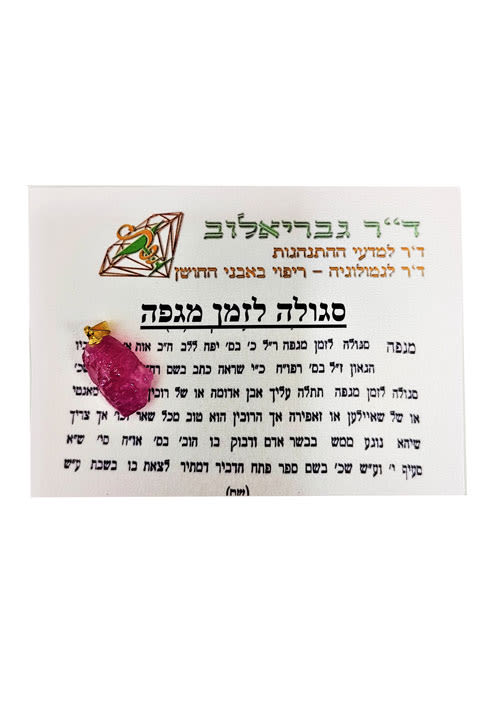
The Matchmaker
One day, the Baal Shem Tov called Elimelech into his study for a serious talk. "You have now come of age. It is time for you to think of marriage…

"Go and take a wife for my son. . . ." Genesis 24:4
And then there was the time that Reb Shmuel, a wealthy man and ardent chossid of the Baal Shem Tov came to visit his Rebbe, as he did several times every year. Usually, his wife Chana encouraged these visits. But this time her parting words were, "It is the same story each time you go. You promise me that you will ask the Rebbe to give us a blessing for children. But you always return with some excuse like he didn't pay you any attention or told you he'd see you later or you forgot to mention it to him. Isn't it enough that you give a fortune of charity to the needy at his court and to the Rebbe himself for any cause he suggests? Let the Rebbe do something for you just once. If you don't come back this time with news that he gave us a blessing to have children, I will divorce you."
So the entire time Reb Shmuel was in Mezibush visiting the Rebbe he had a heavy heart. How could he ask the Baal Shem Tov for a blessing as his wife required? Nevertheless, just before he left, he apologetically asked the Rebbe for a blessing for children.
"What good does my money do me if there is no one to inherit it afterwards?" he sighed. "Yes. I would rather have a son than riches."
Reb Shmuel rushed home with the good news. When he told her the condition about losing wealth she replied, "Shmuel, I agree with what you told the Rebbe. I would rather have a son than our money. As to the child being raised in the house of the Baal Shem Tov, what more could one ask for their child?"
Reb Shmuel returned to the Baal Shem Tov and told him he and his wife agreed to the conditions.
The Baal Shem Tov had additional instructions for Shmuel. "When you return home, you will learn that a huge fire has wiped you out financially both in business and at home. Your wife will shortly become pregnant and you will both be forced to wander with the other homeless beggars from town to town in search of food and a roof over your heads. When your wife is in her last months of pregnancy, you can both come to me. I will provide a room in my house until she gives birth."
When they arrived in Mezibush, the Baal Shem Tov greeted them and took them to a room he had already set aside. Then he told them, "Reb Shmuel you can remain here with your wife until she has given birth and the bris has been performed. Then you must return to your travels and begging. Your wife can remain here for the next three years until the child is weaned and ready to begin school. Then I will send her to you. The child will remain here with me and I will raise him as my own son."
The couple was overjoyed to think that their son would be raised by such a holy godfather and that he would surely grow up to be a tzadik himself.
Little Elimelech grew up in the Baal Shem Tov's household. From the time he began school at three years old, he showed amazing aptitude. His quick and perceptive mind understood and retained everything he was taught and before long he was known as an iluy-genius. The years sped by and Elimelech turned eighteen.
Elimelech did not hesitate following his Rebbe's instructions. He went straight to the village and was directed a broken down, one room hut that was the sofer's home. He knocked on the door and was invited in by the sofer's wife. She explained that her husband was at the synagogue and would soon return.
Elimelech sat down to wait. He looked over the meager surroundings. In one corner sat a young girl of thirteen wearing a dress made of patches. She was introduced to him as their only daughter Malka.
And he began, "Many, many years ago, there lived a mighty king. He and his queen had only one son that they loved dearly. The boy was blessed with a brilliant mind. The more he studied, the more he wanted to know. He took an interest in every area of knowledge and before long had learned all that his teachers could offer. He sought out all the scholars in the kingdom and before long there was nothing more they could teach him.
The prince explained to his father the king, "I have explored all the wisdom that can he learned in this country." "I would like to travel to other countries and learn knowledge taught there. Will you please give me a carriage, a servant, and enough money for me to take an extended journey?"
The king and queen soon saw it was useless arguing with their son and they finally gave in to his request. They outfitted him with a carriage, horses, a servant and a chest full of money. Then they tearfully let him go out into the world.
Starting with bordering country the young prince visited the universities and houses of learning, absorbing anything that was new to him. And so he went from one country to the next and then the next.
Meanwhile his supply of funds was dwindling. When his money was gone he was forced to sell his servant, then his horses and finally, his royal carriage. He was undaunted, however, for it was a small sum to pay for knowledge. Finally, he found himself penniless, walking along a snow covered road. He was cold and hungry and was hoping for a sign of civilization, for someone who might have pity on him and take him in for the night.
The prince walked on for three days, deeper into a thick forest, not meeting a soul all the while. When he was at the end of his endurance, he raised his eyes heavenward and exclaimed, "I firmly believe in the Creator of heaven and earth. It is He Who watches over me and guides my steps. Only He can save me now from death. Please, dear G·d, listen to my prayer and let me live."
Suddenly, he saw a light flickering in the distance. "Who can possibly be living in the midst of this desolate forest?" he wondered. "Most probably some robbers. But even they may have some pity upon a freezing, starving harmless young man." The prince mustered up his last ounce of strength and made it to the house. He knocked weakly on the door.
It was immediately opened by an old man who bade the prince come in. The prince told him his sad tale and begged for a warm drink. The old man bustled about preparing a warm meal which the prince attacked with much gusto. When he had eaten his fill, he was given a place to sleep.
The prince lay down and sighed in utter contentment and was about to fall asleep in utter exhaustion.
Having provided for his guest, the old man opened up a large volume of Talmud and began to study in a singsong chant, soon becoming oblivious to his surroundings. The prince, who had been about to fall asleep, felt his fatigue melt away. After all the years he had spent in study, all the countries he had visited and all the languages he had learned, he had never come across anything like what the old man was studying. His mind quickened with interest and he jumped out of bed.
"Please, teach me. I want to learn Torah too," the prince begged.
"But that is impossible. You must wait at least until tomorrow," the Jew smiled at his eagerness. "Tomorrow I will call together a quorum of men. Then you can be circumcised and purify yourself in the mikveh. Afterwards you can begin to study Torah."
The prince went back to bed, disappointed. He found that he was too excited to fall asleep and he stayed awake that entire night in anticipation of his conversion.
"How could the old man, living in a deep forest, manage to round up a minyan?" the Baal Shem Tov asked his listeners. "I will tell you who the nine other men were. They were none other than our seven Shepherds – the Avraham, Yitchak, Yakov, Yosef, Moshe, Aharon and King David. They were joined by two of Yakov's sons."
The young prince did not wait until he was healed. He launched into the study of aleph bais, which he mastered with ease, and then into Chumash, Mishnah and before long was deep into Talmud. The prince did not approach his Jewish studies as he had pursued science and philosophy in the secular world. The old Jew inculcated him with a fear of G·d and piety; the more he learned, the more pious and righteous he became. By the year's end, the prince had become an accomplished Torah scholar, well versed in all the aspects of Jewish knowledge.
When the old man felt secure that he would remain thus, he called the young man to him. "The time has come," he said, "for you to return home to your parents, the king and queen. I have obtained your horses and carriage and your servant as well. Take them and go home to assume the throne. You need not give up your Jewish way of life. You must remain hidden a righteous man whose greatness is not a recognized by others."
It was hard for the prince to leave this utopian way of life, delving into the study he loved, but he heeded his mentor and returned home. His father had lost hope of ever being reunited with his only beloved son. When he saw him standing before his very eyes, he could not contain his joy.
The young prince had one request to make of his father. "Having traveled extensively all around the world," he explained, "I have changed my mode of living. I need my own residence. Could I have my own palace built to my requirements?" There was nothing that the elderly king would not do for his son and this request was a mere trifle. The king ordered a team of workers to follow the prince's own blueprint and the latter soon had a royal residence of his own where he could do what he wanted without being observed by curious eyes.
The prince now arranged for ten Torah scholars and their families to come and inhabit permanent quarters within the palace. He also maintained a staff of his own mohel and shochet. And no one outside the palace walls was aware that the young prince was actually a practicing Jew.
At this time, the old king learned that a neighboring monarch was preparing to wage war against him. Having lived all his life in peace, the old king was afraid of battle and untutored in the strategies of war. He called his wise son to him, seeking his advice.
The young prince fought bravely and cleverly, easily winning an important victory for his people. When the vanquished king was brought before the prince, he had one request to make of the victor. 'I am at your mercy now. My land and everything that I own is yours. Do me the great kindness of taking my daughter for a wife so that you can both rule our two countries together."
He thought about the suggestion and then said, "I would like to speak to the princess first." He was taken to the princess and asked to talk to her alone. "I am a Jew," the prince confessed to her. "I live in my own palace and keep all the practices and customs of the Jews. If you wish to marry me, you must agree to accept my way of life and become a Jewess yourself." The princess looked at the handsome young prince and thought of the kingdom he was offering her. Her choice was obvious. When he heard her answer, the prince instructed the young girl to go to a Jewish settlement where she could be properly converted and learn the laws that pertained to her new role as wife and future Jewish mother. The marriage was held upon her return. The royal couple went to live in the prince's palace where they could practice their Judaism in privacy. They lived out their days in modesty and piety, rearing children that became Torah scholars. And they were always mindful of their Jewish brethren, helping whenever the opportunity offered. When the two converts arrived at the heavenly court, it was assumed that they would be delegated to Gan Eden, having practiced all the mitzvos religiously for all of their converted lives as exemplary Jews. But just as they were being led to their place, a prosecuting angel rushed up. "Wait!" he shouted. "These two people are not eligible for Gan Eden. They were born and lived many years of their life as non-Jews. It is not fitting that they be admitted to the dwelling place of the most righteous tzadikim." The heavenly court was forced to admit that the angel had a point. There was only one thing to do; that was to send the two souls down to earth once again to make amends for their shortcoming. In their new life on earth they would be born as Jews. "And now you understand, most honored guests," the Baal Shem Tov concluded, "why our bride and groom make such a fitting match. They are none other than the king and queen of our story. Even their names – Elimelech and Malka – point to that. And so, chosson and callah, we wish you many happy years together in this life as in the world-to-come. Mazel Tov!"









Tell us what you think!
Thank you for your comment!
It will be published after approval by the Editor.